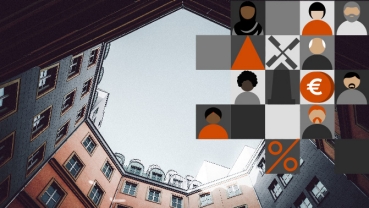
Thanks to over 5800 colleagues in the Netherlands, our contact with clients, and our partnerships, PwC is in close touch with society. We continuously ask ourselves how we can help to improve societal trust and ensure sustainable progress. To be able to keep answering this question in a world that is changing faster than ever before, we also actively converse with our societal stakeholders. This allows us to better understand their expectations and to incorporate them into our work.
The views of our stakeholders help us to become a better organisation and to offer relevant services as auditors, tax advisers and consultants.

Understanding the expectations of stakeholders: PwC stakeholder dialogue
1v1 discussions
During the course of the year, we hold so-called stakeholder meetings with our clients and colleagues, as well as with politicians, supervisory board members, civil servants, NGO’s, opinion makers and academics. During financial year 2023/2024, 32 of such 1v1 discussions were organised.
Each stakeholder meeting is conducted by a member of the board of management, often assisted by a member of the supervisory board, a young colleague or a content specialist. A report is compiled for each meeting. This report is then used as input when identifying the common theme and the most important messages of the stakeholder dialogue for different groups of stakeholders.
Number of formalised stakeholder discussions per stakeholder group, per financial year
|
2023/2024 | 2022/2023 |
|---|---|---|
| Academics | 3 | 2 |
Civil servants |
4 | 6 |
Colleagues (incl. groups) |
5 | 6 |
Supervisory board members |
3 | 0 |
Clients and suppliers |
7 | 6 |
Umbrella organisations |
2 | 4 |
NGO’s and social partners |
2 | 7 |
Opinion makers |
2 | 2 |
Politicians |
1 | 4 |
Regulators |
3 | 0 |
Total number of meetings: |
32 | 37 |
Annual cycle
Output from the stakeholder dialogue is one of the sources we use for our internal dialogue about the long-term strategy of our organisation, our way of communicating, and the choices we make when defining business operations or fine-tuning our services. We then inform discussion partners from last year about specific changes or actions (and the public via our annual report), which helps to complete the whole cycle. We repeat this cycle every year because public expectations are subject to change.

Key messages PwC stakeholder dialogue 2023/2024
- Contribute to accelerating the transition to a sustainable economy
- Be an active voice in the public debate
- Focus on innovation from a human perspective
Contribute to accelerating the transition to a sustainable economy
Stakeholders see an important role for PwC in helping clients with their sustainability journey, something with which they are struggling. They state that we can have the greatest impact on sustainability through our client services rather than through our own operations. Stakeholders therefore recommend that we continue to focus on services related to ESG (environmental, social, governance) and to challenge our clients on these themes. This role is in good hands with PwC as we have also set ESG objectives for ourselves and communicate transparently about them. Stakeholders find it positive that we do this both as an organisation ourselves and in connection with others, for example by embracing the VNO-NCW Tax Governance Code.
Be an active voice in the public debate
Our stakeholders find PwC an interesting voice in the public debate because we advise and audit many different types of organisations and therefore have a good idea of the challenges that both public and private organisations face. Stakeholders ask us to share not only these perspectives but also the solutions we see for those challenges. They insist on the urgency of getting involved in the societal debate and sharing knowledge because they are concerned about polarisation, the decline in societal trust, the speed and, therefore, the unpredictability of policy changes and the increasing complexity of legislation. Stakeholders point out that sticking your neck out in the societal debate also means being held accountable for things that PwC itself is not doing or has not done properly. Those things inevitably exist as mistakes will always be made. Stakeholders therefore recommend communicating proactively about them.
Focus on innovation from a human perspective
Stakeholders see how PwC is changing its way of working, for instance by using AI. They appreciate that PwC is upskilling its employees. In particular, they challenge us on the use of innovation by auditors, as there can be a tendency to keep things the same in regulated professions. The use of technology and innovation is important for stakeholders, but always from a human perspective. Stakeholders see that PwC adopts an open and vulnerable attitude in discussions with clients and stakeholders, shares dilemmas and strives to learn from each other and from other organisations. PwC's strength lies in these various ways of seeking connections, they say. Some stakeholders also are encouraging auditors to demonstrate more courage during AGMs.





















